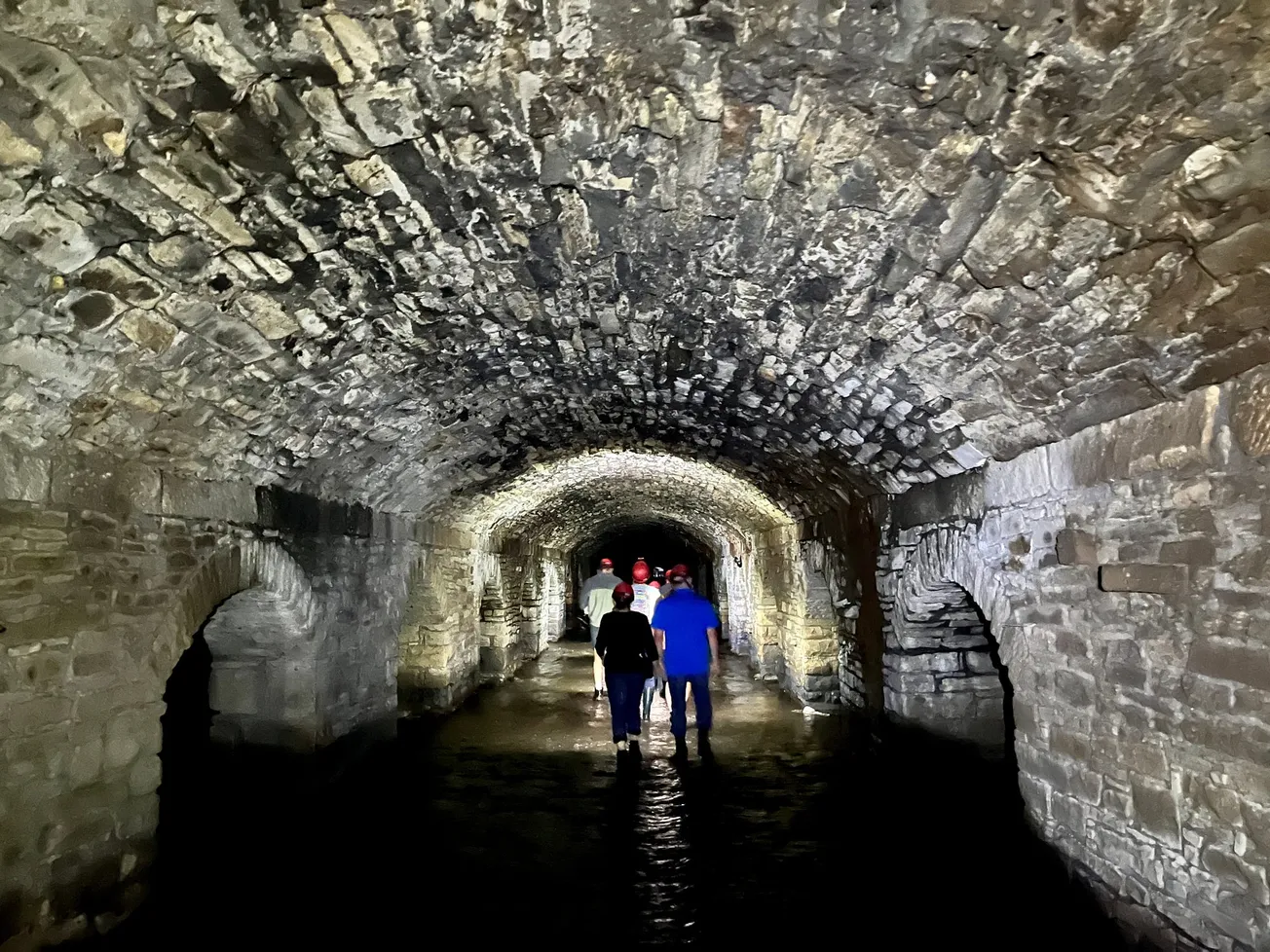Good morning readers — and welcome to Thursday’s Tribune.
Sheffield’s underground world is the stuff of legend. Tales of secret tunnels connecting Manor Lodge, Sheffield Castle, the Cathedral and the Old Queen’s Head have been passed down for centuries. Most of the rivers that run through the city centre also do so below ground, with one part of the culverted River Sheaf under Castlegate even referred to as the Megatron due to its awe-inspiring size. I’ve long been fascinated by this “dark Sheffield” that is hidden away beneath our feet, but I’ve never had the chance to explore it myself — until now.
Help us out: We're working on a weekend read about the new production of Miss Saigon at the Crucible and we’d love to hear from our readers about their thoughts. Do you plan to go, or will you give it a wide berth? Do you work in theatre and have some special industry insight we could benefit from? Please get in touch with Victoria on victoria@sheffieldtribune.co.uk or 07436 921926 if you would like to contribute to the piece.
Editor’s note: The comments we get on our stories are sometimes the best way of telling people what we do. In our piece about Meersbrook’s missing post last week, one reader wrote: “I just love how The Tribune finds local stories which others may overlook — fantastic stories in their own right — and then makes sense of them within a wider national context!” That is exactly what we wanted to do when we started this two years ago, but we can only spend the time we need to on stories thanks to the support we get from our members. Please join them today.
Mini-briefing
🏛️ Sheffield City Council have demanded that the owner of the Old Town Hall takes action to secure it after emergency services were called out multiple times to the building. The police and fire service have attended the building several times in recent weeks to reports of break ins and fires. When The Tribune visited on Tuesday, workers inside said they were boarding up windows. The Old Town Hall was bought by owner Gunes “Gary” Ata of Noble City Living in 2021, with the developer saying he wanted to turn the building into apartments. However, work has yet to begin. Sheffield City Council told us their building control department had requested Mr Ata carry out urgent work to secure the building.
🎸 The long-running battle over control of The Leadmill could be completed in early 2024, according to the building’s owner. Dominic Madden of the London-based Electric Group told The Star that he hoped that a hearing to rule on the ownership of the building would take place in the first quarter of next year. If Electric Group were to be successful, leaseholder Phil Mills would have three months to vacate the building. The Leadmill management are yet to comment.
🖼️ A great piece in the Guardian about Sheffield-born artist Corbin Shaw. The 24-year-old tells the paper that his work — which examines both masculinity and nationalism — is inspired by his exposure to football terraces, boxing gyms and working-class pubs when he was growing up. His art has since been used by the charity Women’s Aid, and a new digital piece by him at the Domo restaurant in Kelham Island is part of the Sheffield’s Look Up augmented reality art trail.

Things to do
🖼️ Opening tomorrow (Friday, 14 July) at the Graves Gallery is a new exhibition all about the Scottish colourists. Colour and Light explores the lives and work of one of the most talented, experimental and distinctive groups in 20th century British art. The free exhibition includes paintings, sculpture and works on paper from the Fleming Collection (considered one of the finest collection of Scottish art in the world), alongside two works from Sheffield’s collection.
🌈 This Saturday, 15 July, Sheffield Pinknic celebrates the city’s LGBTQ+ community in the beautiful surroundings of the Peace Gardens. The annual event will start at 10.30am with a “unity march” from Barker’s Pool. At Pinknic itself (11am-7pm), expect a family-friendly day of music, entertainment and food stalls. An afterparty featuring live performances, games and pride anthems will take place at the Revolution de Cuba bar off West Street from 7pm-2pm.
👩🔧 The new Millennium Gallery exhibition Spanners in the Works tells the story of Gwenda’s Garage, a lesbian-run car-repair workshop set up in Sheffield in the 1980s. As well as fixing cars, the garage was a hub for feminist campaigns and fought against Section 28, the 1988 law that criminalised the “promotion” of homosexuality. A free talk telling the story of the garage and celebrating women in non-traditional trades takes place at the gallery on Saturday, 15 July (2pm-3pm).

Why Sheffield needs its rivers again
“Find a spot against the wall,” says our guide Anthony Wood. For an arachnophobe like me, this is not exactly what I wanted to hear.
We’re in a long, dark, narrow tunnel, just a few metres under Park Square roundabout. We’re lit only by the helmet lights of a dozen or so of my fellow explorers. The damp walls of the passage I’m in, which were built in the late 1850s, are covered with cobwebs and crawl with dozens of worryingly big spiders.
As a result of my phobia I don’t lean quite as tightly to the wall as some of my companions. But when we’re all in position, Anthony, a guide from the Sheaf and Porter River Trust, asks us to turn off our lights. It’s an exercise in sensory deprivation, and a lesson in just how much is hidden beneath the streets we walk on every day.

As each light goes off, and then someone struggles to turn their phone off, the blackness that envelopes us is total. I hold my hand up to my face and can’t see a thing. Traffic must be roaring over our heads but we are oblivious. All we can hear is the gentle trickle of water.
An hour or so earlier we’d set off from the Porter Brook pocket park on Matilda Street, sliding gracefully into the river on our bottoms before heading down into Sheffield’s subterranean stream system. In this part of the city centre, the Porter regularly alternates between open and culverted sections. When we pop out near the train station some wide-eyed pedestrians look down at a group of people dressed in caving gear like we’ve gone completely mad.
As we disappear from view again the Porter soon becomes the Sheaf, and the concrete tunnel we’re wading through becomes a vast stone-built chamber with vaulted ceilings and columns stretching out into the darkness. From when we enter at the southern end of Sheffield railway station until the Sheaf joins the Don in Castlegate, the river is now almost totally hidden from view. We’re able to walk down the Sheaf until we reach the famous Megatron chamber, a huge cathedral-like structure with deep water which blocks our way. A tiny chink of daylight where the Sheaf meets the Don in the far distance is all we can see.

As we walk back, Anthony Wood explains the rationale behind these vast subterranean structures. By the early 19th century, the rapidly growing city of Sheffield had begun to use the Sheaf essentially as an open air sewer. As we’ve reported before, dozens of dead dogs and cats could be seen floating in its slimy water and raw sewage used to ooze through its partially walled banks. After 402 people died in the Sheffield cholera epidemic of 1832, the city fathers decided to act. By the time Sheffield’s rivers began to be covered up in the late 1850s, people didn’t just accept it, they positively welcomed it.
Sheffield deserves great journalism. You can help make it happen.
You're halfway there, the rest of the story is behind this paywall. Join the Tribune for full access to local news that matters, just £8.95/month.
SubscribeAlready have an account? Sign In
Comments
How to comment:
If you are already a member,
click here to sign in
and leave a comment.
If you aren't a member,
sign up here
to be able to leave a comment.
To add your photo, click here to create a profile on Gravatar.







